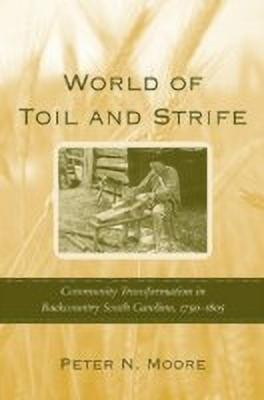World of Toil and Strife(English, Hardcover, Moore Peter N.)
Quick Overview
Product Price Comparison
Using the community of the Waxhaws as his proving ground, Peter N. Moore challenges the notion that the Carolina upcountry was a static, undeveloped backwater until entrepreneurial cotton planters entered the region after 1800. Moore looks through the lens of a single community - a predominately Scots-Irish settlement in the lower Catawba River valley in what is today Fairfield, Lancaster, York, and Chester counties - to document the social, economic, and cultural characteristics of a locale that was dynamic before planters set their sights on piedmont South Carolina. Moore shows that social tensions within the Waxhaw community drove its transformation, rather than the land-grabbing speculators and aggressive planters. He identifies the forces for change within the Waxhaw community - immigration patterns, neighborhood rivalries, population growth, and developing markets for slaves and wheat. By 1800 the Waxhaws bore little resemblance to the backcountry community of the late colonial period. Moore complicates the broader picture of the transformation of the southern interior. He also contributes to the debate over the rural transition to capitalism and engages the literature of the evangelical Great Revival to demonstrate the influence of revivals, familial loyalties, and doctrinal differences on the region's religious culture. Telling a more inclusive story than many studies of the late-colonial piedmont, ""World of Toil and Strife"" points to the importance of Indian-white conflicts in shaping both the geography of local communities and the mentality of white settlers. Throughout the volume, Moore relocates the origins of southernness to an earlier period, arguing that commercial agriculture, slavery, and evangelical religion took hold in the upcountry immediately after the Revolution, long before the arrival of cotton culture.


